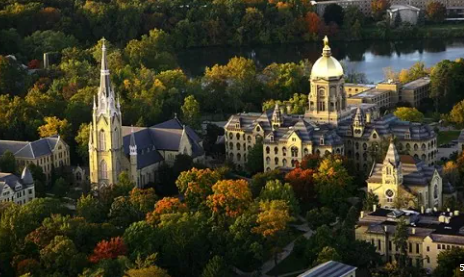When you’re choosing a university, everyone talks about rankings, professors, and facilities. Those things matter, sure. But there’s something else that might matter even more in the long run: the people you’ll be connected to for the rest of your life.
A strong alumni network is like having thousands of older siblings scattered around the world who want to help you succeed. These are people who will answer your emails, take your phone calls, give you career advice, and sometimes even hire you. In the Midwest, some universities have built alumni communities that are genuinely special. Let me tell you about them.
What Makes an Alumni Network Actually Strong?
Before we look at specific schools, let’s think about what we mean by a “strong” alumni network. It’s not just about having lots of graduates. Harvard has hundreds of thousands of alumni, but that doesn’t mean they all help each other.
A truly strong network has a few key things. First, alumni actually identify with their school years after leaving. They wear the school colors, attend games, donate money, and feel connected to the place. Second, they actively help younger graduates. We’re talking about returning calls from strangers who went to the same school, offering internships, making introductions, and opening doors. Third, there’s some kind of organized system that makes these connections easy to find and use.
The best alumni networks feel less like a database and more like a family. People help each other not because they have to but because they want to. That kind of loyalty doesn’t happen by accident. It comes from schools that create strong student experiences and then maintain those connections intentionally.
University of Notre Dame
Notre Dame in Indiana might have the most devoted alumni base of any university in America. I’m serious. Notre Dame graduates are famously loyal to their school, and that loyalty translates into real help for younger alumni.
Walk into almost any major company’s office wearing Notre Dame gear, and there’s a good chance someone will stop you to talk about the school. That’s not an exaggeration. Notre Dame alumni are everywhere, and they recognize each other. The school has about 140,000 living alumni, which is large but not massive. What makes the difference is how connected they stay.
The Notre Dame Alumni Association is incredibly well organized. There are alumni clubs in over 275 cities around the world. These aren’t just email lists either. They hold regular events, game watches, service projects, and networking sessions. If you move to a new city after graduation, you can immediately plug into a community of Notre Dame people who will welcome you.
But the real magic happens in one-on-one connections. Notre Dame graduates genuinely help each other find jobs. A recent graduate told me she got her first job interview because a Notre Dame alumnus she’d never met saw her resume, noticed the school connection, and made sure she got a shot. That kind of thing happens constantly.
Part of this comes from the school’s Catholic identity and emphasis on service to others. Students are taught that being part of the Notre Dame family means looking out for each other. But honestly, I think it’s also about the intense school spirit. Notre Dame football creates this shared identity that lasts forever. Even people who never attended a game somehow feel connected to that tradition.
The business school (Mendoza) and engineering school both have particularly active alumni networks within the larger Notre Dame community. Finance and consulting graduates especially seem to help each other move up in those industries.
One small challenge: Notre Dame’s network is so tight-knit that it can feel a bit exclusive. If you didn’t go there, you’re outside the circle. But if you did go there, you’re in for life.
Northwestern University
Northwestern, just outside Chicago in Evanston, has built an alumni network that’s particularly strong in media, business, and law. The school’s graduates tend to be ambitious and career-focused, which shapes how the network operates.
About 230,000 alumni are part of Northwestern’s network. What makes it powerful is the concentration of graduates in major cities, especially Chicago, New York, Los Angeles, and San Francisco. If you’re trying to break into journalism, entertainment, consulting, or finance, Northwestern connections can open crucial doors.
The journalism school (Medill) has an especially legendary network. Medill graduates are all over the media industry, from local news stations to the New York Times to major networks. They’re known for helping younger Medill grads get internships and entry-level positions. In an industry where getting your foot in the door is half the battle, these connections matter enormously.
The business school (Kellogg) focuses on MBAs, but the undergraduate business programs also produce graduates who help each other in the corporate world. Northwestern students often intern at major Chicago companies during school, and those internships frequently turn into full-time offers after graduation.
What I find interesting about Northwestern’s network is how professional it is. People help each other, but it’s more businesslike than emotional. You won’t find the same intense school spirit as at Notre Dame or Michigan. Instead, you find a network of ambitious people who understand that helping fellow alumni is smart networking. That might sound cold, but it’s actually pretty effective.
The school’s career services actively facilitates alumni connections. They maintain a database where you can search for alumni by industry and location, then reach out for informational interviews. Not everyone responds, but enough people do that it’s a valuable resource.
Chicago’s business community is full of Northwestern graduates, which creates natural mentoring relationships. A student studying finance can attend networking events where Northwestern alumni dominate the room. That makes breaking in much easier than trying to navigate without any connections.
University of Michigan
Michigan’s alumni network might be the largest and most widespread of any school in the Midwest. With over 640,000 living alumni, Wolverines are literally everywhere. But size alone doesn’t make a network strong. What makes Michigan special is the genuine affection alumni feel for the school.
Walk around campus in Ann Arbor, and you’ll see people of all ages wearing Michigan gear. Alumni come back for football games from across the country. That attachment to place and tradition creates a foundation for helping younger graduates. Someone who still gets emotional singing “The Victors” thirty years after graduation is someone who’ll take your call when you need career advice.
The Michigan Alumni Association has clubs in all 50 states and over 75 countries. Wherever you end up, there’s probably a group of Michigan alumni nearby. These clubs aren’t just for watching football games (though that happens). They organize professional networking events, service projects, and social gatherings that keep people connected.
The business school (Ross) has a particularly active network. Ross graduates tend to go into consulting and finance, and they maintain strong connections as they advance in their careers. The engineering school (one of the largest and best in the country) also has great alumni support, with Michigan engineers helping younger grads find positions at tech companies and traditional engineering firms.
What Michigan does well is creating affinity groups within the larger network. There are clubs for women, veterans, LGBTQ+ alumni, and various ethnic communities. These smaller networks within the larger one help people find mentors who understand their specific experiences and challenges.
One thing I’ve noticed about Michigan alumni is that they’re competitive about helping each other. Like, if they hear that Ohio State alumni are good at networking, Michigan people will work even harder to outdo them. That rivalry (which runs deep for anyone who doesn’t follow college football) actually benefits younger graduates because it motivates older alumni to stay engaged.
The school’s reputation is strong across the Midwest and nationally, which helps. A Michigan degree carries weight in job applications, and having Michigan alumni in hiring positions who are predisposed to help you is a real advantage.
University of Wisconsin-Madison
Wisconsin has a different vibe from Northwestern or Michigan, but its alumni network is quietly powerful. About 470,000 living alumni make up the network, and they’re scattered across the Midwest and beyond.
What makes Wisconsin’s network distinctive is how down-to-earth it is. Wisconsin grads aren’t typically working at fancy New York investment banks (though some are). They’re more likely to be working in solid careers across all sorts of industries throughout the Midwest. That widespread presence across normal jobs and companies actually makes the network more accessible for typical graduates.
The Wisconsin Alumni Association is one of the oldest in the country and is really well organized. Alumni clubs exist in dozens of cities, and they’re active. The university maintains strong connections with graduates through events, publications, and outreach.
Engineering and business graduates from Wisconsin have particularly strong networks. The engineering school places a lot of students at major companies in Milwaukee, Chicago, and throughout the Midwest. Business school graduates often stay in the region, creating a concentration of Wisconsin alumni in Midwest businesses.
One cool thing Wisconsin does is the “Badger Volunteers” program, which connects alumni with current students for mentoring and career advice. It’s formalized in a way that makes reaching out less awkward. You’re not just cold-calling some stranger; you’re participating in an official program where people have signed up to help.
Wisconsin’s network is strong in state government, education, and agriculture, reflecting the school’s land-grant mission and location. If you’re interested in those fields, Wisconsin connections can be really valuable. The network in other fields exists, but isn’t as concentrated.
The school spirit at Wisconsin is real. Alumni love Madison, they love the campus, they love their college experience. That emotional attachment means they want to help keep the Wisconsin community strong by supporting younger graduates.
Purdue University
Purdue in Indiana has a massive alumni base (over 540,000) and a network that’s especially powerful in engineering and technology fields. If you want to work in engineering, aerospace, or technology, Purdue’s connections are hard to beat.
Neil Armstrong went to Purdue. So did Eugene Cernan, the last person to walk on the moon. The school’s aerospace program has produced dozens of astronauts, which creates this legendary status in engineering circles. That reputation means Purdue graduates have instant credibility in technical fields.
The alumni network is particularly strong at major engineering companies. Boeing, Lockheed Martin, Caterpillar, General Motors, and countless other firms have significant numbers of Purdue graduates. These alumni actively recruit at Purdue and tend to favor hiring from their alma mater. In engineering, where job prospects are generally good anyway, Purdue connections give you an extra edge.
The Boilermaker network (Purdue students are called Boilermakers) is less flashy than Northwestern’s and less emotional than Notre Dame’s. It’s practical and focused on results. Purdue people help each other get jobs, share technical knowledge, and support each other’s careers. It’s not about attending fancy networking events; it’s about engineers helping engineers.
Purdue’s career services maintains strong relationships with companies that hire engineers. The career fairs are enormous, with hundreds of companies showing up to recruit. Many of the recruiters are Purdue alumni who know the school’s programs well and trust the preparation students receive.
The network is strongest in the Midwest, particularly in Indiana, Illinois, and Ohio, where many Purdue graduates stay after school. But because engineering is a national field, you’ll find Purdue alumni at major companies across the country. That geographic spread helps graduates who want to relocate for jobs.
One limitation is that Purdue’s network is heavily tilted toward technical fields. If you’re studying liberal arts or social sciences, the network still exists but isn’t as robust or active. The school knows this and has been working to strengthen connections for non-engineering graduates, but engineering dominates the culture and the alumni engagement.
Ohio State University
Ohio State is enormous. We’re talking about over 600,000 living alumni, one of the largest alumni bases of any university. That size creates opportunities but also challenges for maintaining a tight-knit network.
What makes Ohio State’s network work is the incredible school spirit. Buckeyes are fanatic about their football team and their school. That shared identity creates instant connections. Two Ohio State grads meeting for the first time will probably start talking about football within minutes. That common ground makes networking feel less transactional and more like meeting family.
The Alumni Association has clubs everywhere, especially throughout Ohio, the Midwest, and major cities nationwide. Football watch parties bring alumni together regularly, creating social connections that often lead to professional ones. Someone you meet while watching the Ohio State vs. Michigan game might later help you get an interview at their company.
The business school (Fisher) has built a strong network in finance, accounting, and marketing. Columbus is home to several Fortune 500 companies, and Ohio State graduates are well-represented at these firms. The engineering school also has good alumni connections, particularly in Ohio’s manufacturing sector.
What’s interesting about Ohio State is how the network varies by location. In Ohio, the network is incredibly strong because Ohio State graduates are everywhere. In other parts of the country, you’ll still find alumni, but the density isn’t the same. If you plan to work in Ohio after graduation, the network is amazing. If you want to move to California, you’ll find Ohio State people there, but you won’t have the same advantage.
The university has invested heavily in career services and alumni engagement. They run networking events, maintain online directories, and facilitate connections between students and alumni. With such a massive alumni base, organization matters, and Ohio State has gotten better at this over the years.
One challenge with such a large network is that not everyone is equally helpful. Some Ohio State alumni are incredibly generous with their time and connections. Others won’t respond to your emails. That’s true anywhere, but with 600,000 alumni, you need to be persistent and willing to reach out to multiple people to find the ones who will help.
University of Iowa
Iowa might not be the most famous school on this list, but it has a surprisingly strong and loyal alumni network. About 270,000 alumni are part of the Iowa community, and they maintain genuine connections to the school.
What Iowa does well is creating personal connections. The school isn’t so large that you get lost, but it’s big enough to have alumni spread across many industries and locations. Iowa graduates in business, journalism, and healthcare are particularly active in helping younger alumni.
The Iowa Alumni Association organizes events and maintains active clubs in cities throughout the Midwest and beyond. Iowa City itself creates strong memories for students. People love their time there and want to help maintain the community by supporting younger graduates.
The business school has good placement in Chicago, Des Moines, and throughout the Midwest. The Writer’s Workshop, one of the best creative writing programs in the country, has an alumni network that’s incredibly supportive in the writing and publishing world. Healthcare-related programs also have strong networks, given Iowa’s excellent medical programs.
Iowa’s network is characterized by Midwestern friendliness. People respond to emails, take phone calls, and genuinely want to help. It’s not the most powerful network for breaking into elite finance or consulting, but for finding solid jobs throughout the Midwest, Iowa connections are valuable.
The school spirit is real, but more laid-back than at places like Ohio State or Michigan. Iowa alumni are proud of their school without being overwhelming about it. That makes networking feel natural rather than forced.
University of Illinois Urbana-Champaign
Illinois has over 470,000 alumni and a network that’s particularly strong in engineering, computer science, and business. The school’s engineering programs are highly ranked, and graduates are well-represented at major tech companies.
The engineering alumni network is the real strength here. Illinois engineering graduates are at Google, Microsoft, Amazon, and virtually every major tech company. In Silicon Valley, Illinois has a significant presence despite being a Midwest school. These alumni tend to help younger graduates break into competitive tech jobs.
The business school also has strong alumni connections, particularly in Chicago, where many graduates work. Accounting and finance graduates find that Illinois connections help them land positions at major firms.
What makes Illinois’s network interesting is its reach beyond the Midwest. Because engineering and computer science are national fields, Illinois graduates are everywhere. That geographic diversity creates opportunities no matter where you want to work after graduation.
The school’s alumni association maintains clubs in major cities and organizes networking events. The career services office actively connects students with alumni who can provide advice and job leads. In competitive fields like computer science, having alumni willing to refer you for positions can make the difference between getting interviews and being ignored.
One challenge at Illinois is that the network can feel less personal than at smaller schools. With so many alumni, you’re less likely to find that instant family feeling you get at Notre Dame. But the trade-off is having more potential connections to reach out to across different industries and locations.
What Actually Matters About Alumni Networks
Looking at all these schools, what should you really think about when considering alumni networks? Here are the things that matter most based on what I’ve learned.
Active Participation Rates: A school can have a million alumni, but if only 5% of them stay engaged with the university, the network isn’t that helpful. Look for schools where alumni actually attend events, respond to networking requests, and maintain connections. Notre Dame and Michigan excel at this.
Geographic Concentration: Some networks are strong everywhere. Others are powerful in specific regions but weaker elsewhere. Think about where you want to work after graduation. If you want to stay in the Midwest, any of these schools will help you. If you want to work in New York or California, schools like Northwestern and Illinois might offer more connections.
Industry Strength: Different networks excel in different fields. Northwestern dominates in media. Purdue rules in engineering. If you know what industry you want to enter, look for schools with strong networks there.
School Culture and Spirit: The strongest networks come from schools where students have genuinely great experiences that they want to relive and share with others. Schools with strong sports traditions (Notre Dame, Michigan, Ohio State) tend to have very engaged alumni because those traditions create lasting emotional connections.
Organized Systems: The best schools don’t just hope alumni help each other. They create formal programs, databases, and events that facilitate connections. Look for schools with active alumni associations and career services that leverage alumni networks effectively.





